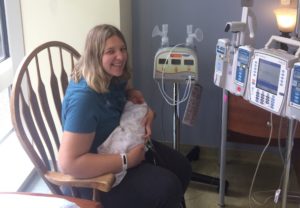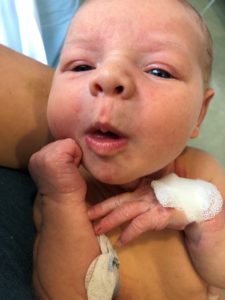 Please don’t kiss my baby. You may have seen this campaign on social media lately or even seen a cute sign on the handle of a baby stroller or car seat. Some people may even roll their eyes at this request but there is merit to it.
Please don’t kiss my baby. You may have seen this campaign on social media lately or even seen a cute sign on the handle of a baby stroller or car seat. Some people may even roll their eyes at this request but there is merit to it.
Some may know that I gave birth to my first child in August. What many people don’t know is that at three days old my baby was admitted to the hospital with suspected HSV-1, (Herpes Simplex Virus) the virus that produces cold sores. We ended up staying in the hospital for 21 days to receive anti-viral treatments to make sure our baby was healthy. Thankfully, everything turned out fine, but that is not always the case with HSV-1.
Many Americans have HSV-1, with most getting exposed between 1-5 years of age, typically in a child care setting. HSV-1  can stay dormant in your system for years even if you don’t show symptoms. So even if you may have never had a cold sore, haven’t had one for years, or get them and are not showing symptoms, it is still possible to pass on the virus to others.
can stay dormant in your system for years even if you don’t show symptoms. So even if you may have never had a cold sore, haven’t had one for years, or get them and are not showing symptoms, it is still possible to pass on the virus to others.
Being exposed to the virus after the first few months of life is not life altering. However, infants in the first six weeks of life lack the brain barrier that helps fight the virus from getting into the brain. Because of this, if a baby contracts HSV-1 it can turn into sepsis, meningitis, encephalitis, create eye problems, and an array of other serious and lifelong problems.
Even if you don’t show symptoms of a cold sore, kissing is a common way that HSV-1 can be passed through saliva. Kissing a baby on the lips, face, or even hands (as babies love to put their hands in their mouth), causes potential for passing on HSV-1 and a host of other illnesses that can have ongoing or fatal results for our littles. While it may be difficult to refrain from kissing or pinching those adorable baby cheeks, please keep your germs to yourself!

